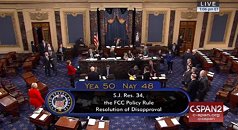Friday, March 24th 2017
Invading Subscriber Privacy - Senate Says ISPs Can Now Sell Your Data
The US Senate on Thursday passed a joint resolution to eliminate broadband privacy rules that would have required ISPs to get consumers' explicit consent before selling or sharing Web browsing data and other private information with advertisers and other companies. This win was pulled by a hair - 48 Nay against 50 Yea - and went entirely through party lines, with Republicans voting Yea, and the Democrats voting Nay. The effects won't be immediate, mind you - the measure will have to pass the House and then be signed by President Donald Trump before it can become law.The FCC's privacy rules that are now put in peril would require ISPs to get opt-in consent from consumers before selling or sharing personal information. This includes geo-location data, financial and health information, children's information, Social Security numbers, Web browsing history, app usage history, and the content of communications - things we can all agree give almost unthinkable leeway in understanding your daily habits. Opt-out requirements, on the other hand, would have applied to less sensitive data such as e-mail addresses and service tier information, much less important in the scheme of things.
These opt-in and opt-out provisions were to take effect as early as December 4, 2017. The rules would also force ISPs to clearly notify customers about the types of information they collected, specifying how they use and share the information, and identifying the types of entities they'd share the information with.
The FCC's privacy rules also had a data security component that would have required ISPs to take "reasonable" steps to protect customers' information from theft and data breaches. This was supposed to take effect on March 2, but the FCC's Republican majority halted the rule's implementation. Another set of requirements related to data breach notifications is scheduled to take effect on June 2.
As was to be expected, party lines didn't fracture only on the Senate floor, with comments and positions regarding the voting separating cleanly in all other areas.
Ajit Pai, the new chairman of the newly Republican-led FCC, welcomed the Senate vote, telling reporters that his own core goal was "to make sure that uniform expectation of privacy is vindicated through the use of a regulatory framework that establishes a more level playing field."
Senator Bill Nelson, on the other hand, said during Senate floor debate that "Your home broadband provider can know when you wake up each day-either by knowing the time each morning that you log on to the Internet to check the weather/news of the morning, or through a connected device in your home (...) and that provider may know immediately if you are not feeling well - assuming you decide to peruse the Internet like most of us to get a quick check on your symptoms. In fact, your broadband provider may know more about your health - and your reaction to illness - than you are willing to share with your doctor."
Home Internet providers can also "build a profile about your listening and viewing habits." Mobile broadband providers, on the other hand, "know how you move about your day through information about your geo-location and Internet activity through your mobile device," Senator Bill Nelson said.
"This is a gold mine of data-the holy grail so to speak," Nelson said. "It is no wonder that broadband providers want to be able to sell this information to the highest bidder without consumers' knowledge or consent. And they want to collect and use this information without providing transparency or being held accountable."
This measure also ties the FCC's hands in advancing "substantially similar" rules in the future. Kate Tummarello, a policy analyst for the nonprofit Electronic Frontier Foundation (EFF), pits this as a "crushing loss for online privacy."
"ISPs act as gatekeepers to the Internet, giving them incredible access to records of what you do online," Tummarello said. "They shouldn't be able to profit off of the information about what you search for, read about, purchase and more without your consent."
What is your opinion on this matter? is this the way you envision your connected life?
Sources:
NBC News, Ars Technica, Senate.gov
These opt-in and opt-out provisions were to take effect as early as December 4, 2017. The rules would also force ISPs to clearly notify customers about the types of information they collected, specifying how they use and share the information, and identifying the types of entities they'd share the information with.
The FCC's privacy rules also had a data security component that would have required ISPs to take "reasonable" steps to protect customers' information from theft and data breaches. This was supposed to take effect on March 2, but the FCC's Republican majority halted the rule's implementation. Another set of requirements related to data breach notifications is scheduled to take effect on June 2.
As was to be expected, party lines didn't fracture only on the Senate floor, with comments and positions regarding the voting separating cleanly in all other areas.
Ajit Pai, the new chairman of the newly Republican-led FCC, welcomed the Senate vote, telling reporters that his own core goal was "to make sure that uniform expectation of privacy is vindicated through the use of a regulatory framework that establishes a more level playing field."
Senator Bill Nelson, on the other hand, said during Senate floor debate that "Your home broadband provider can know when you wake up each day-either by knowing the time each morning that you log on to the Internet to check the weather/news of the morning, or through a connected device in your home (...) and that provider may know immediately if you are not feeling well - assuming you decide to peruse the Internet like most of us to get a quick check on your symptoms. In fact, your broadband provider may know more about your health - and your reaction to illness - than you are willing to share with your doctor."
Home Internet providers can also "build a profile about your listening and viewing habits." Mobile broadband providers, on the other hand, "know how you move about your day through information about your geo-location and Internet activity through your mobile device," Senator Bill Nelson said.
"This is a gold mine of data-the holy grail so to speak," Nelson said. "It is no wonder that broadband providers want to be able to sell this information to the highest bidder without consumers' knowledge or consent. And they want to collect and use this information without providing transparency or being held accountable."
This measure also ties the FCC's hands in advancing "substantially similar" rules in the future. Kate Tummarello, a policy analyst for the nonprofit Electronic Frontier Foundation (EFF), pits this as a "crushing loss for online privacy."
"ISPs act as gatekeepers to the Internet, giving them incredible access to records of what you do online," Tummarello said. "They shouldn't be able to profit off of the information about what you search for, read about, purchase and more without your consent."
What is your opinion on this matter? is this the way you envision your connected life?


109 Comments on Invading Subscriber Privacy - Senate Says ISPs Can Now Sell Your Data
PeopleWallets1. I am in Canada.
2. I don't really have much to hide. Well, I've got my porn collection but most men do. I hardly use torrents, either. I pay for what I download.
Human history and logic dictates that sooner or later the Internet will be regulated more and more. That's how a new frontier becomes old and another new frontier will be discovered eventually where false hopes will be born again.
I am sure people felt the same about the wild west of America. People resisted. But era moved on.
you just pay once.
it will be glorious
1. Not saying that I didn't care when the CIA did it but the CIA is not my ISP and is a third party.
2. ISPs are in the best position collect information about people whether it is harmless or not.
3. This is opening up everyone's info to anyone willing to open up their wallet to pay for whatever they're asking which includes the aforementioned CIA.
4. There goes any semblance of net neutrality/privacy.
5. This is the gov't backdooring CIA/DHS/NSA's failed spying efforts by awarding ISP's the right to sell our info, which works for them because all they need to do now is simply purchase the info of persons of interest without doing any of the work, or due process since it is a purchase.
It will be the new, HUGE, frontier for mankind. I can feel it... I just won't be there to experience it.
Wish I was born 1,000 years later...
If this passes, and you can bet that it is highly likely it will given the current F the little guy even if they did vote for 45 atmosphere in DC, the NSA/CIA/your favorite US three-letter security agency will only have to demand it from your ISP.
FYI regulated doesn't have to mean you give up any of your freedom. In fact the article in question only pertained to the ISP's ABILITY TO SELL YOUR DATA.
Also, the wild west turned into California, Nveda, ect. Last I checked, the only freedom they gave up in comparison to the wild west was the constant threat of violence. You seems to have one hell of a misconstrued vision of the past.